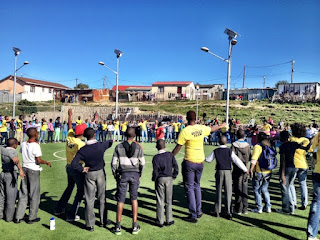Grassroot sport is usually at local levels with government exhortations and various agencies supporting sporting activities. At this level, sports fosters social integration among different ethnic groups as it is among the several factors that contribute to positive exchange of language, custom, culture, tradition, lifestyle and building relationships between different groups. It creates an environment in which people can come together to work towards the same goal, show respect for others and share space and equipment. All these aspects are crucial to peace-building processes within a community or state. Through sports, coaches have big impact on their players emotional behaviours, helping them to be optimistic in all situations, be in control at all times, be able to handle conflict, be focused, co-operative and socially integrated.
Locally organized sports provide foundation for skill development, long term participation and physical health. Research has shown that increasing physical activity and participating in organized sports can have many benefits especially for children, such as building confidence, promoting a healthy lifestyle, development of physical, mental, social and emotional skills and these positively contribute to strengthen national pride and form a cohesive national identity.
Its no news that sport provides a positive image of the nation to the international community. Sports at the international sphere all have beginings in sports at the grassroot level. Every top sport person was once a grassroots player with each progressing through the development stages of free play, organised sessions and their talents developed in a club environment. However, exluding the fact that grassroot sport is not a new element in development cooperation, it has been used in an ad hoc way to reach development-related objectives as far back as the 1920s.
For example, within the United Nations, humanitarian aid workers have tapped the potential of sport as a means to improve the conditions of victims of conflict and natural disasters for many years. Today, more and more national and international development organisations are using sport to add to their approaches in local, regional and global development and peace promotion programmes but despite recent progress, the systematic use of sport and physical education for development is still in its early stages in some part of the world as many remain unconvinced of the impact sports can have on reaching development and humanitarian objectives, its huge connection with societal development and economic growth and its means of job creation and income generation.
Sports at the grassroots or community level has a potential role as an educational and social vehicle that cannot be underestimated. It needs to be promoted for the benefit of young people, the society and the games themself but just like lost time, gone are the days we had street tournaments. I’m not sure amateur football leagues still exist, but still, time passed can be regained. Its not too late to take off from where we stopped.
#Stay Tickled















0 comments:
Post a Comment